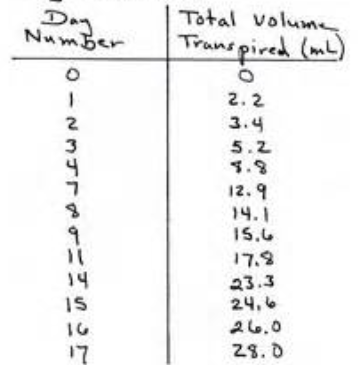Analysis
 Analysis is all about data collection and processing. Students are expected to collect sufficient data, even if they have to repeat some of the data collection or find data from a simulation or database to reinforce the data collected.
Analysis is all about data collection and processing. Students are expected to collect sufficient data, even if they have to repeat some of the data collection or find data from a simulation or database to reinforce the data collected.
All analysis and data processing should be done with the aim of answering the research question. Conclusions should be based on data collected not on theory or expectations.
If variability in the data makes it difficult to identify a clear conclusion the students should demonstrate this variability and write about it in the analysis.
The word “conclusion” in the analysis refers to what the graph shows or how a statistical test supports or doesn't support the conclusion. The comparison of the conclusion to the research question comes in the Evaluation section.
Analysis – sufficient and appropriate
The analysis must use the raw data and lead to a valid conclusion.
Avoid the easy to correct problems:
- Collect enough raw data
- Present the data clearly – use detailed labels and units
- Be consistent with decimal points, uncertainties and labels in tables, graphs and calculations.
Keep it relevant.
- Don’t include repetitive graphs which don’t show relationships between variables.
- Explain your calculations and show an example.
- Describe correlations or trends in your data.
| ANALYSIS | ||||
| Raw data is | Data processing | Impact of uncertainties | Interpretation of processed data | |
| 6 | Sufficient. Could support a detailed and valid conclusion. | Appropriate and sufficient accuracy enables a conclusion to the RQ to be drawn that is fully consistent with data. | Full and appropriate consideration. | Correct valid and detailed conclusion. |
| 4 | Relevant but incomplete. Could support a simple or partially valid conclusion. | Appropriate and sufficient. Could lead to a broadly valid conclusion but significant inaccuracies and inconsistencies in the processing. | Some consideration. | Broadly valid limited conclusion. |
| 2 | Insufficient to support a valid conclusion. | Basic, inaccurate or too insufficient to lead to a valid conclusion | Little consideration. | Incorrect or insufficient invalid or very incomplete |
| 0 | Standard not reached. | Standard not reached. | Standard not reached. | Standard not reached. |

 IB Docs (2) Team
IB Docs (2) Team
